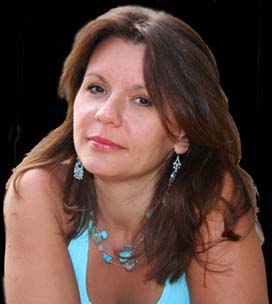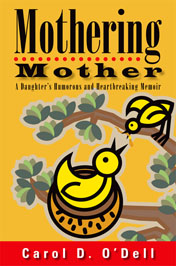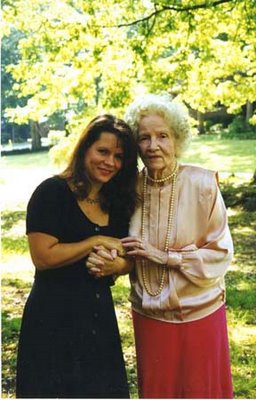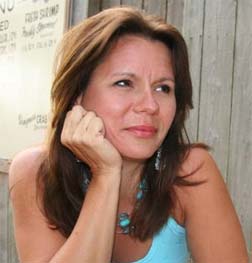B. Lynn Goodwin, author of Journaling for Caregivers, Launches her Blog Tour!
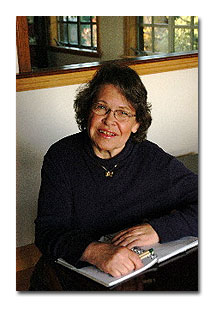
& Book Giveaway Comments Contest!
During the six years she spent caring for her mother, B. Lynn Goodwin found comfort in the journaling she did. She eventually began teaching journaling workshops and writing a book to guide other caregivers through journaling.
Lynn is also a teacher, editor, and writer. Her work has been published in Hip Mama; the Oakland Tribune; the Contra Costa Times; the Danville Weekly; Staying Sane When You're Dieting; Small Press Review; Dramatics Magazine; Career, Caregiving, and Self-Care NCDA Monograph; 24/7--a caregiving anthology; We Care; Families of Loved Ones Magazine (forthcoming); Kaleidoscope (forthcoming), and numerous e-zines and blogs.
Find out more about B. Lynn Goodwin by visiting her websites:
Book Website: https://www.writeradvice.com/ywmtdw.html
Writer Advice: https://www.writeradvice.com/
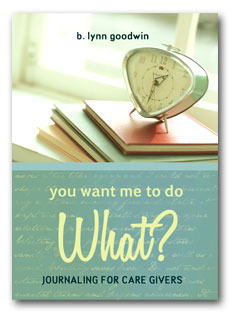 You Want Me To Do What? Journaling for Care Givers
You Want Me To Do What? Journaling for Care GiversBy B. Lynn Goodwin
You Want Me To Do What? Journaling for Caregivers offers encouragement, instructions, and over 200 sentence prompts to help anyone start putting their thoughts on paper.
It is for current, former, and long distance caregivers. These are the people who take care of spouses, parents, children, special needs children, and themselves. It is also for professional caregivers including nurses, social workers, teachers, and anyone in the helping professions.
Published by Tate Publishing
Paperback: 160 pages
ISBN: 1606962973
Book Giveaway Comments Contest!
If you received our Events Newsletter, remember, we are holding a contest to win a copy of Lynn's book, You Want Me To Do What? Journaling for Caregivers, to those that comment. So, grab a cup of coffee, pull up a chair, and enjoy the chat, and share your thoughts, and comments, at the end. We will randomly choose a winner from those who comment. Enjoy!
Interview by Jodi Webb
WOW: Your book, You Want Me To Do What? Journaling for Caregivers, is a book encouraging caregivers (everyone really) to journal. Can you tell us when you first started journaling?
Lynn: I have been a sporadic journaler since I got my first five-year diary when I was in third grade. I have a journal from college, but stopped journaling once I began teaching English and directing high school and college theatre. Now, of course, I wish I had recorded what we did and how I felt about it. I slid back into journaling in 1997. I was turning Haven's List into a newsletter that would become Writer Advice, tutoring, teaching A is for Acting, and had begun caregiving. I'm glad I have my journals from that time.
WOW: How did you discover that journaling was helping you when you were caring for your mother? Did it make you a better caregiver?
Lynn: I loved my mother but sometimes her needs seemed unreasonable. Sometimes I resented her refusal to accept outside help. I had a love/hate relationship with her line, "My Person will take care of that." I was Person and she was Missus. These private nicknames helped us remember that we loved each other, even though we sometimes grated on each other's nerves.
Sometimes it angered me that she preferred Lean Cuisine to my cooking, that she wouldn't let me put away the groceries without wiping off every single package, that she made me sit in her house and watch her struggle because she said, "I have to do some things for myself." Journaling helped me get past my anger and fear that drove it. It helped me analyze, process, explore, evaluate, and strategize. It allowed me to take my stress out on my journal instead of my mother, so absolutely it made me a better caregiver.
WOW: Not all of us are caring for an elderly parent. Can your book help those readers who aren't caregivers? Or are we all caregivers?
Lynn: Let me answer the last question first. All human beings are caregivers for someone. You might care for a spouse, parent, child, special needs child, or yourself--especially in the current economic climate. If you are a nurse, teacher, social worker, EMT, physical therapist, psychologist, or Hospice Volunteer, you are a professional caregiver.
Have you ever blown off steam at someone who did not deserve it? Have you ever wished someone would listen to you without interrupting? Have you ever needed a non-judgmental sympathetic ear? Who hasn't?
I can't promise that you'll never get angry or irrational if you journal. I can promise that you'll have a safe place to look beyond your immediate reactions. Journals are a place to record your history. Whether you make lists, write letters, write poems, blurt, or tell your story in traditional prose, your journal is the perfect vessel to receive your story.
WOW: Journaling (or lack of) is my guilty secret. As a writer, everyone tells me I should have a journal. I've started and abandoned more journals than I can count. So, tell me your secrets. How do you find the time to journal?
Lynn: Julia Cameron (www.theartistsway.com) says that you should start your day with Morning Pages. I say it's always morning somewhere. Write whenever you want. I have been known to journal in my car, in front of the TV, and in the bathroom. I also journal in coffee shops, shopping malls, and occasionally at my father's old desk.
Do it anywhere, anytime. Try to write for 10 minutes if you are starting out. If your journaling runs on endlessly, try setting a timer.
There are no rules unless you make some up. Start over any time, day or night. Your stories are eager to come out, and as you release them you will find a wave of material rushing in to fill the space. Who but you can tell your story?
WOW: Are lives are so full of...well, everything and anything. Why do you make journaling a priority?
Lynn: I always feel better after I journal. I feel cleansed. I feel my creative channels opening up. I usually stop spinning my wheels and start moving forward. Since 1997, I have journaled pretty steadily. It keeps me sane. It opens ideas. Since I know it works and I get immediate satisfaction from doing it, why wouldn't I make it a priority?
WOW: You make a great case for journaling. I may have to pull out one of those half-filled journals of mine! But before I do, what about blogs? Are they this generation's journals?
Lynn: Many blogs are the equivalent of interactive journals. Instead of having my own blog, I've spent the last year responding to other people's blogs. That way, I'm putting my voice out to a wider audience and still identifying myself with my signature line.
When I reread old journals, I get to see how I've grown and how my concerns have changed. I get to see what issues I have let go of and what subjects continue to be obsessions. I wouldn't have that with a blog. I wouldn't have a record. If my journals survive me, if they wind up in a Thrift Station or garage sale or in a great niece's backpack, they could ultimately become one woman's view of life in the decades before and after the turn of the millennium. That's less likely to happen with a blog.
WOW: Tell us about your other writing experiences.
Lynn: I've been the owner of Writer Advice, and its predecessor, Haven's List, since 1997. I've had lots of experience with author interviews, book and website reviews, and other non-fiction found on the site. I've developed Writer Advice's Annual Flash Prose Contest. I've written numerous articles, stories, and personal essays and have been published in magazines, newspapers, e-zines, and blogs. I've also put in some time creating a young adult novel, which is on the back burner at the moment.
WOW: Did journaling help your other writing?
Lynn: Absolutely. My writing has gotten more specific and more sophisticated over the years. As I retell stories or reply facts, I hone in on what I really want to say. Journaling has also helped me clarify what I do and don't want to write about and provided the raw writing out of which many published pieces have grown.
WOW: You Want Me To Do What? Journaling for Caregivers isn't a traditional book in many senses. First, it isn't a "read these words" book, it's more of a workbook with writing prompts and advice. When did you decide to write this book?
Lynn: About 36 hours after a friend told me she was going to write a book of prompts for writers, I heard a voice, right outside my head, that said, "Journaling for Caregivers." Those three words articulated a cloudy idea that had been swimming in my head for some time. I realized that everybody could benefit from journaling, but most caregivers didn't know they could write. They didn't realize that everyone who writes is a writer. I made it my mission to introduce caregivers to the idea. I knew how to encourage writers and I had been writing sentence starts for my free writing group in Berkeley and before that for my high school students. Once I got this idea, the book started falling into place. Once I began marketing it, I realized that everyone is a caregiver for someone.
WOW: What portion of the book is taken up with writing prompts?
Lynn: Four of the nine chapters are filled with sentence starts. There are over 50 in each chapter. People should have choices. What appeals on one day might not on another. What speaks to one caregiver, parent, teacher, nurse, or professional might not to another. In my workshops I sometimes ask people to pick a sentence start that we all could write from. Giving them that choice empowers them.
WOW: Tell us about your road to publication.
Lynn: I found two agents who were very interested. One had moved from her New York agency to be closer to her ailing mother and was telecommuting. The other had a sister who was caring for aging parents in Florida. They knew what caregivers went through. They recognized this as a niche book that met a need, just as Sharon Bray, the author of When Words Heal: Writing Your Way Through Cancer did when she said, "As someone steeped in the therapeutic value of writing during pain and loss, I think B. Lynn Goodwin's book meets a need that has yet to be addressed."
Both of the agents' bosses said, "We have no way to market to caregivers." The agents validated that I had a book that would meet a need. They also made me realize that I would have to find a less traditional method to get it on the market. I began looking for smaller publishers and found one that believed the book was marketable. The concept came to me in 2006 and the book was published by the end of 2008.
WOW: As we can see from the reactions of those first two publishers, your book is not the traditional type someone walks into a bookstore and picks up on a whim--it's written for a very specific audience with a very specific need. Have you done many traditional bookstore signings and appearances or have you been thinking outside the box?
Lynn: It's safe to say that I think out of the box. Sometimes I'm so far outside the box that I am not sure whether to cal this a book or a service project. It depends, perhaps, on who I am sharing it with. I'm impressed by how much more outreach I have been able to do than I ever imagined. Nurses come up to me at bookstore signings. Even if they don't buy a book, they take a card for the office.
I've shared the book with all kinds of caregivers, volunteers, and organizations. I offer e-mail workshops called Journaling: Gateway to Self Discovery that give people a chance to try the process without leaving home. Day by day, I continue to reach out as many places as I can.
WOW: How about interviews, etc.--any outside the norm of book pages in newspapers, book review sites?
Lynn: I've done lots of interviews for blogs and special interest groups I've found through LinkedIn. One day I found a bill in my mailbox for the head of a Hospice support organization in Southern California. I have an article that will be coming out in their next newsletter. It will go all over the state. I took an ad in a publication that was given out at the AARP Convention in Las Vegas this October.
I've done radio interviews for all kinds of shows. I've made presentations in libraries. I've teamed up with someone helping teens and people marketing to seniors and I've developed an extra niche that I love, working with writers who want to find a way through writer's block and into the uniqueness of their own voice. I am putting together a continuing education class for nurses that will be done through e-mail, and that may lead to CEU classes for social workers and teachers. My existing e-mail workshops make it possible for anyone with a computer to try journaling without ever leaving the house.
WOW: For a book that publishers worried wouldn't be marketable you've found plenty of marketing options! And now the question everyone's dying to know the answer to--what does the "B" stand for?
Lynn: Ahhh--B stands for my first name, which is also my mother's first name. My mother didn't need a caregiver. She was fine to live alone as long as I was there every day to take out her garbage, get her mail, bring her her groceries, transport her... She was protecting her independence, and I wanted to help her do it. You Want Me To Do What? Journaling for Caregivers is dedicated to my mother, but I do not mention her name. I do that to honor her because she was a private person. Writing as B. Lynn Goodwin is one way I can include her in this project while keeping her identity anonymous.
WOW: She sounds like a very determined woman. Hearing about her reminds me of my grandmother. For many years, she had the same type of independent living arrangement with the help of my mother and aunts. So, in between interviews and workshops for Journaling for Caregivers what are you up to with your writing?
Lynn: I continue to interview authors, write reviews, facilitate the Writer Advice Flash Prose Contest, and run the e-zine, which you can read right now at www.writeradvice.com. In fact, I'm putting out a call for submissions of 50-500 words on the subject of dreams. I'll pick the best pieces and run them in the winter issue. E-mail me at Lgood67334[at]comcast[dot]net if you would like details.
I am also at work on a couple of other projects that are still in the formative stages. I enjoy carving my own path in the writing world.
----
Want to join Lynn on her blog tour? Check out these dates and mark your calendar! You can also snag a copy of WOW's Events Calendar HERE.
Blog Tour Dates: Come and join the fun!
November 16, 2009 Monday
Lynn will be chatting with WOW! Women On Writing at The Muffin. Stop by and share your comments! One lucky commenter will win copy of Lynn's book!
https://www.wow-womenonwriting.com/blog.html
November 18, 2009 Wednesday
Lynn Goodwin, author of You Want Me To Do What? Journaling for Caregivers, stops by Spirituality and Self Help to share how journaling can save your sanity and save your life! Not to miss.
https://www.superenlightme.com/
November 19, 2009 Thursday
Don't miss B. Lynn Goodwin's post about how journaling can help you become a better mom and a better you! Don't forget to enter to win her book, You Want Me To Do What? Journaling for Caregivers.
https://www.momecentric.com/
November 20, 2009 Friday
B. Lynn Goodwin stops by The Mental Fitness Center to share how journaling helped her as she cared for a family member with Alzheimer's.
https://www.thementalfitnesscenter.com/blog/
November 23, 2009 Monday
Today B. Lynn Goodwin stops by Midlife With a Vengeance to tell us that balancing acts aren't just for the circus! Chime in and tell us how you manage to balance your needs with those of the person you're caring for. You also have a chance to win her book, You Want Me To Do What? Journaling for Caregivers.
https://midlifewithavengeance.com/
December 2, 2009 Wednesday
B. Lynn Goodwin stops by Jan Lundy's blog, Awakened Living, to share how she manages to take care of herself while caring for others, and why we all need to take time out for ourselves. Don't forget to enter to win her book, You Want Me To Do What? Journaling for Caregivers.
https://www.awakened-living.blogspot.com/
December 7, 2009 Monday
Today, author and journal keeper B. Lynn Goodwin stops by Whole Latte Life to tell us how journaling can help you explore your life's passion--no matter what it may be.
https://joannedemaio.blogspot.com/
December 11, 2009 Friday
B. Lynn Goodwin stops by The Feisty Side of Fifty to write about being a caregiver for that person we so often overlook--ourselves.
https://feistysideoffifty.com/
December 15, 2009 Tuesday
Today, Nessa and Lynn chat about why journaling can be so helpful for caregivers at Ramblings of a Texas Housewife.
https://www.texashousewife.com/
We have more dates to come, so be sure to check out our Events Calendar HERE.
Get involved!
 We hope you are as excited about the tour as we are! Mark your calendar, save these dates, and join us for this truly unique and fascinating author blog tour.
We hope you are as excited about the tour as we are! Mark your calendar, save these dates, and join us for this truly unique and fascinating author blog tour.If you have a blog or website and would like to host one of our touring authors, or schedule a tour of your own, please email Angela and Jodi at: blogtour@wow-womenonwriting.com
** Please feel free to copy any portion of this post.
Be sure to comment on this post to enter in a drawing for a copy of Lynn's book You Want Me To Do What? Journaling for Caregivers. And check back in a couple of days in the comments section to see if you won!
Labels: author interview, B. Lynn Goodwin, blog tour, book giveway, caregiving, journal prompts, Journaling for Caregivers, writer advice


